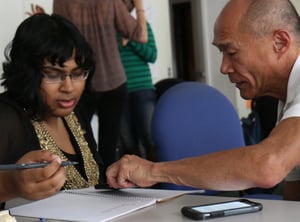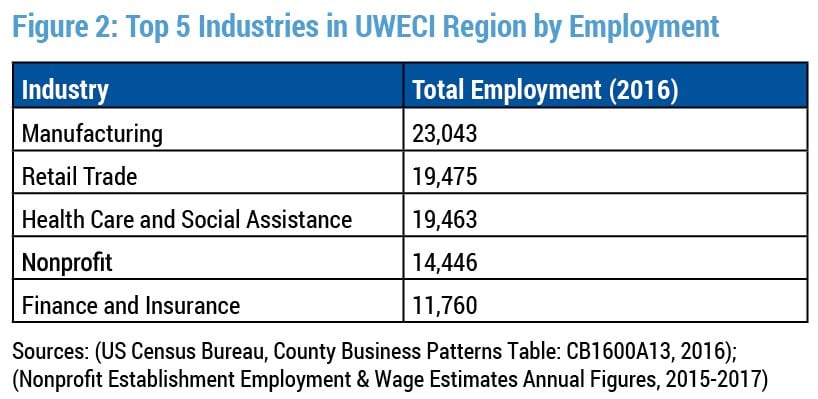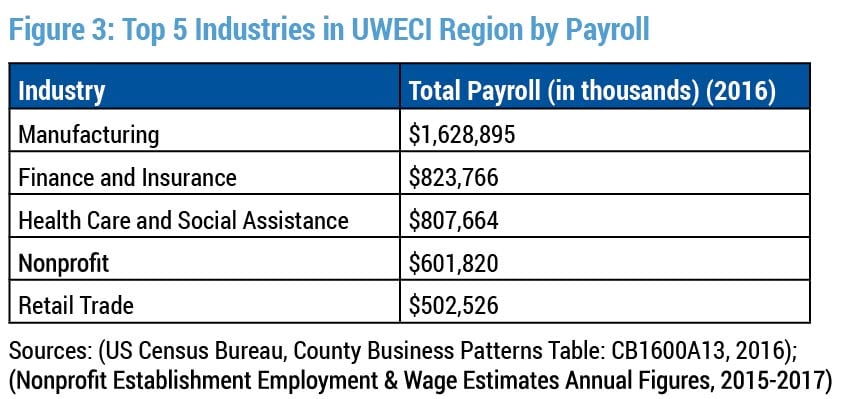Learn how area nonprofits are the engines of a thriving community.
 United Way of East Central Iowa (UWECI) has been a champion of the nonprofit sector for 105 years. UWECI funded nonprofit partners reported serving more than 80,000 individuals in 2018 alone. These organizations are a small fraction of the 400 total nonprofits (registered 501(c)(3)s) that employ over 14,000 individuals in the UWECI five-county region.[1]
United Way of East Central Iowa (UWECI) has been a champion of the nonprofit sector for 105 years. UWECI funded nonprofit partners reported serving more than 80,000 individuals in 2018 alone. These organizations are a small fraction of the 400 total nonprofits (registered 501(c)(3)s) that employ over 14,000 individuals in the UWECI five-county region.[1]
How do nonprofits help fuel our communities?
- Nonprofits generate hundreds of millions of dollars for the area.
Total revenue generated by nonprofits in our region exceeds $820 million with total assets reported over $1.5 billion.[2] Revenue generated by UWECI partners is nearly $140 million of that number.[3]

- Nonprofits are strong even in weak economies.
The nonprofit sector is resilient; showing strength while others weakened in the wake of the 2008 financial crisis. U.S. job growth from 200712:
- Nonprofit sector: +8.5%
- For-profit sector -4.1%.[4]


- Nonprofits employ a considerable amount of the workforce, behind only 3 other industries.
The nonprofit sector is in the top five for both employment and payroll categories. This makes them a strong economic player in the region. The nonprofit sector employed a greater number of individuals than the finance and insurance industry and accounted for more payroll than the retail industry. (See Figures 2 and 3 below for specifics.)
What causes the nonprofit sector to lose momentum?
Using UWECI’s , it is easy to see some undesirable trends.
- Longer wait periods from time of service to payment to an organization (increasing receivables) due to changes in the Medicaid payor system,
- Decreasing number of days an organization can operate using current liquid assets (defensive intervals),
- Increasing volatility in the funding environment,
- Policies detrimental to the success and/or lack of deserving attention,
- And, financial risks that have multiplied resulting in underfunded services and critical community partners lacking capacity for innovation.
However, the sector has shown ingenuity in the face of these obstacles. Volunteers are deployed to increase the capacity of local agencies. UWECI partners engage over 10,000 volunteers annually. As a result, in 2015, Cedar Rapids achieved the 7th highest volunteer rate (38%) among all mid-size cities across the U.S.[5]
How can you help the engine keep going forward?
Recommended priorities from Oliver Wyman in his report, A National Imperative: Joining Forces to Strengthen Human Services in America [6] are:
- Focus on outcomes and accountability by aligning appropriate funding.
- Develop capacity for innovation by sharing data, analysis, and technology.
- Create deeper partnerships and networks across sectors.
- Develop more robust finance and financial risk management capabilities.
- Fully fund the cost of service delivery.
- Align funding to support high impact and accountable organizations
Learn more about the how nonprofits are doing in our community by reading our full Condition of the Nonprofit Sector Report.
[1] Nonprofit Establishment Employment and Wage Estimates Annual Figures. (2015-2017). United States Bureau of Labor Statistics. Retrieved March 2019, from https://www.bls.gov/bdm/nonprofits/nonprofits.htm
[2] The Exempt Organization Business Master File Extract. (2019, October). IRS. Retrieved November 2019, from https://www.irs.gov/charities-non-profits/exempt-organizations-business-master-file-extract-eo-bmf
[3] The Exempt Organization Business Master File Extract. (2019, March). IRS. Retrieved June 2019, from https://www.irs.gov/charities-non-profits/exempt-organizations-business-master-file-extract-eo-bmf
[4] Salamon, L., & Newhouse, C. (2019). The 2019 Nonprofit Employment Report. Nonprofit Economic Data Bulletin no. 47.
[5] Corporation for National & Community Service. (2015). Mid-Size City Rankings by Volunteer Rate. Retrieved 2019, from nationalservice.gov: https://www.nationalservice.gov/vcla/mid-size-city-ranking-volunteer-rate
[6] Oliver Wyman. (2018). A National Imperative: Joining Forces to Strengthen Human Services in America.
